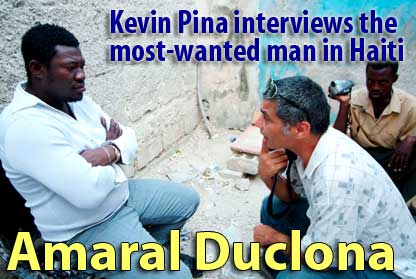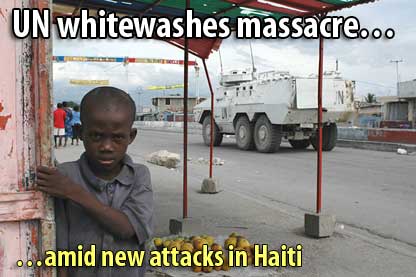 |
| Photo: ©2004 Haiti Information Project Lavalas march at National Palace confront US Marines, the demonstration grew to over 5,000 - March 8, 2004 |
|
see also on HaitiAction.net
click image for article |
 |
 |
 |
 |
 |
Human Rights groups to file Petition against the United States, Dominican Republic and the Coup Government of Haiti for overthrowing Haiti’s democracy in 2004
Press Conference February 2, 2006
Click here to download the 47 page report — 235k PDF
(actual victims names have been deleted)
Remarks of Brian Concannon Jr.
Director, Institute for Justice & Democracy in Haiti
I'd like to give a brief introduction to this case, then introduce you to the other participants, after which we'll take your questions. My name is Brian Concannon, I am the director of the Institute for Justice and Democracy in Haiti. I worked in Haiti on human rights issues from 1995-2004, first with the UN, later with the Bureau des Avocats Internationaux, a group of lawyers established by the constitutional governments to help human rights victims pursue cases in Haitian courts.
We started preparing this petition in August of 2004, 6 months after Haiti's February 29, 2004 coup d'etat. Some of us had had a front row seat to the very open preparations to overthrow Haiti's elected government from 2001-2004. The US imposed an illegal and immoral development assistance embargo on the elected government, while generously supporting the political opposition that had never demonstrated any electoral support. In the Dominican Republic, former soldiers and paramilitaries trained openly, and from time to time crossed the border to attack civilian targets and twice launched coup detat attempts.
Push came to shove in early 2004, when the forces training in the DR launched a major offensive across the border. Haiti and the CARICOM countries requested international assistance for Haiti's embattled constitutional government. Secretary of State Colin Powell said on February 17 that the US "cannot buy into a proposition that says the elected President must be forced out of office by thugs and those who do not respect law and are bringing terrible violence to the Haitian people." But Powell's State Department actively blocked help from coming to Haiti, and 12 days later forced President Aristide onto a plane for the Central African Republic, which allowed "thugs and those who do not respect law" to bring "terrible violence to the Haitian people," including the petitioners in this case.The constitutional government was replaced by an unconstitutional, unelected regime run by a resident of Boca Raton, Florida. It missed election deadlines of June 1, 2004, and November 26, 2005, and will remain in power for at least some time after the end of President Aristide's term next Tuesday. It has incarcerated hundreds of political prisoners, most arrested illegally and held without access to the courts. Thousands have died in political violence, and Haiti's poor, already struggling to get by on less than $1/day, have become poorer.
The CARICOM countries and the Africa Union, together almost a third of the United Nations membership, immediately denounced the coup, and called for an investigation at both the Organization of American States and the UN. Both bodies refused to investigate, and instead ratified the coup by accepting the illegal regime's representatives.
The failure of the very organizations entrusted to promote peace, democracy and sovereignty to respond to such an obviously illegal overthrow of a democratic government spurred us file this suit. We chose the Inter-American Commission on Human Rights because the OAS is one of the leading proponents of democracy in the world. The OAS' Inter-American Democratic Charter, adopted in September, 2001, guaranteed democratic governments and their citizens specific democratic rights, including the right to international assistance when under attack, and for citizens, the rights to vote and run in democratic elections.We are asking the IACHR to practice what the OAS preaches: to declare that the democratic rights guaranteed to the petitioners and other Haitian citizens in the Inter-American Democratic Charter, the OAS Charter and other international instruments are enforceable rights, and that the US, DR and interim Haitian governments' violation of those rights was wrongful.
This suit is particularly timely now, as Haiti approaches elections. The serious flaws and delays of those elections are a good measure of what Haiti lost in its democracy- both of its constitutional presidents transferred power to an elected successor, on schedule, after peaceful elections. But the petition is also important as Haiti moves forward. Because no matter how well the elections are run, they will be an empty exercise unless the international community is willing to accept the choices of Haiti's voters.
Participants:
Moderator: Michelle Karshan
Rahul Rajkumar, Allard K. Lowenstein International Human Rights Clinic at Yale Law School. Yale students helped marshall the facts, and did most of the legal research for the case. The research involved a lot of breaking trail- as far as we know this is the first suit filed on behalf of citizens to vindicate democratic rights lost by the overthrow of their government.
Nicole Lee, Director of Operations, TransAfrica. Nicole has worked on Haiti Human Rights issues since 2002, with the BAI in Haiti and with Global Justice and now TransAfrica in Washington.
Ira Kurzban, immigration lawyer in Miami and chair of the board of IJDH. He has represented Haitian refugees for thirty years, and represented the Constitutional Haitian governments for 13 years. Ira was actively involved in negotiations between the Haitian government and the U.S., the OAS, and the company that provided President Aristide's security.
Click here to download the 47 page report — 235k PDF
(actual victims names have been deleted)
For more information:
eMail Brian@ijdh.org, or call 541-432-0597
A recording of the press conference is available at Box 641-297-4800 , Access Code: 2377
See Also: Maxine Waters urges the Inter-American Commission on Human Rights to investigate the Coup d'État Feb 2





